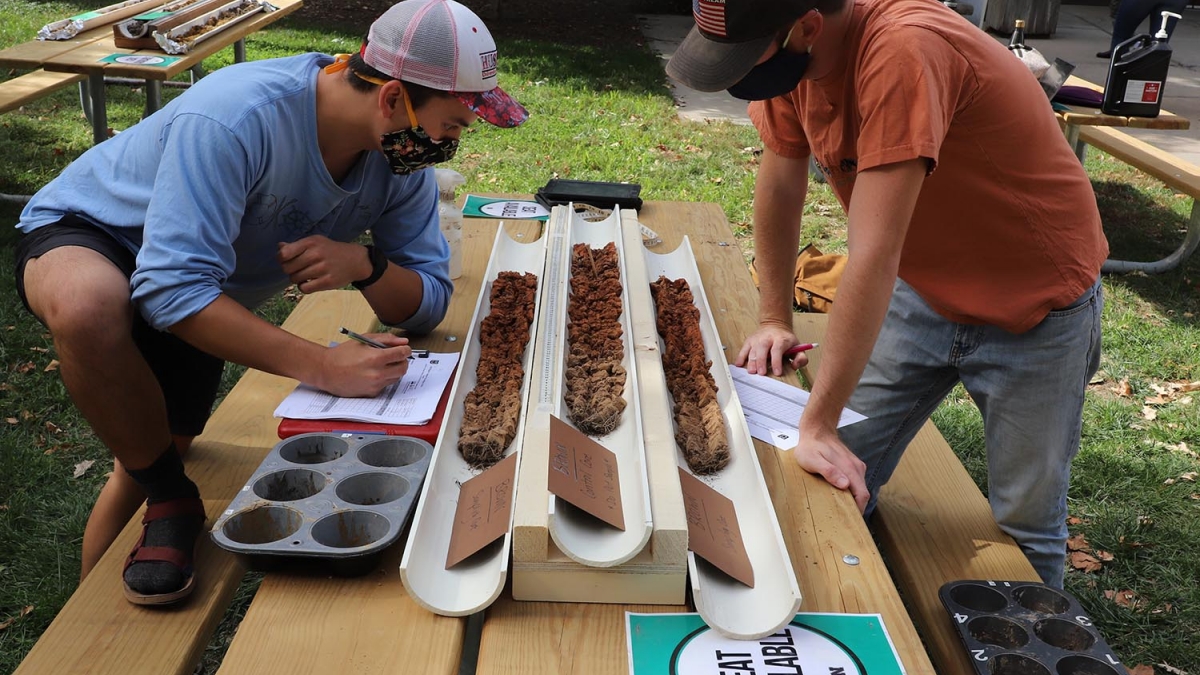
Lincoln, Neb. —On Oct. 1, a minivan arrived at Hardin Hall on the University of Nebraska-Lincoln East Campus, where the driver dropped off 30 cores of Missouri soil, each contained in a tube measuring about six feet. Normally, the UNL Soil Judging Team would have traveled to the soil, said co-coach Judith Turk, pedologist with the Conservation and Survey Division at the School of Natural Resources. But this year it came to them.
In an effort to reduce the spread of the coronavirus, the Region 5 Soil Judging Competition, which was going to be hosted by the University of Missouri-Columbia in central Missouri, is instead being held virtually this year. The week of Oct. 5, students at UNL, University of Nebraska-Omaha, Iowa State University, Kansas State University, University of Minnesota, South Dakota State University and the University of Missouri will begin thorough, hour-long examinations of five competition soils.
Co-coach Rebecca Young, assistant professor of practice in Agronomy and Horticulture, said that, as far back as May, the UNL team began preparing for the fall 2020 competition as though the contest would be held remotely.
"There's a lot of time that goes into prepping for a contest like this, and if we were going to change from in-person to remote learning, like the abrupt change we had in the spring, we would need to be prepared for something like that," Young said.
Eleven students are on the 2020 team, which is made up of two returning members from UNL’s championship 2019 squad and nine new participants. Like in-person competitions, the team will have an hour to examine each core of soil. Normally, team members would spend a portion of that hour in a giant soil pit. Only so many people can get in the pit at once, so team members rotate in and out, meaning that the time of each task must be intricately structured.
"With this, we can be less strict with how we're structuring their time within that hour," Turk said.
During typical years, the traveling team would get three days of practice sessions before the contest took place in one day, rain or shine. This year, there's more flexibility. The practice rounds were conducted in Hardin Hall on Oct. 2. Starting Oct. 5, they'll be examining a contest soil each day. It's more spread out, and allows the students to fit in time to participate in the contest while also attending classes virtually or in person.
Though the setting is changed substantially, the end goal is the same, to provide a detailed profile of each soil sample. Turk said that the first thing team members do is pick out the soil horizons, the different layers in the soil. Then the team describes the various properties of those layers -- color, texture, etc. Based on those descriptions, they create a host of interpretations about the soil. How does water move through it? How does it scientifically classify? How would you use the land this comes from, based on the soil's properties?
Normally, the teams set up shop in a town near the host campus or contest area, and the properties where they conduct soil assessments are within about a 45-minute drive. This year, since driving isn't an issue, the contest organizers collected samples from a more widespread region than usual. Soil samples from five different Missouri counties are being judged this year.
"This was an opportunity for them to get some pretty unique soils that they might not have gotten to otherwise," Young said. "That's great for the students because they're seeing more variability of what could exist in Central Missouri rather than what sites were available to dig a giant hole in that landowners wouldn't mind being there for a week or two."
Up until late September, the 2020 UNL Soil Judging Team held its meetings virtually. When they finally convened last month, Turk and Young gave out name tags just in case the members couldn’t recognize each other with their masks on. The 2020 team members are: Katie Boden, Matthew Brauch, Chase Bucknell, Matthew Chen, Erik Henry, Trey Johnson, Johnathan Kelly, Phuong Minh Tu Le, Nickolas Sanders, Emilee Schilke and Clare Wilton.
The annual competition is an event that team members and coaches look forward to all fall semester, Turk said. Not being able to travel to a host campus, or host it as UNL did in Grand Island last fall, will be different.
"I have two big things that I'm going to miss," Turk said. "A lot of what we want the students to get out of this is understanding that, when you dig a hole it's not just completely random what you're going to find there. There's a connection between the landscape you observe above ground and what you're going to find underground. Not being on-site, it's going to be more challenging to teach those concepts. They'll give us maps. They'll give us photos of the landscape. But it's not quite the same as actually being there. And the other thing I think I'll miss about the structure of the contest is that, in a normal contest, because you're travelling and you're gone for a week, you're completely immersed in it for a week."
But, both Turk and Young said, there was no way that the coronavirus was going to cancel the contest.
“We’re a weird little niche of people who love being out in a rainy soil pit for a week,” Young said. “You tell us we can’t, we will find a way.”
Cory Matteson, SNR Communications